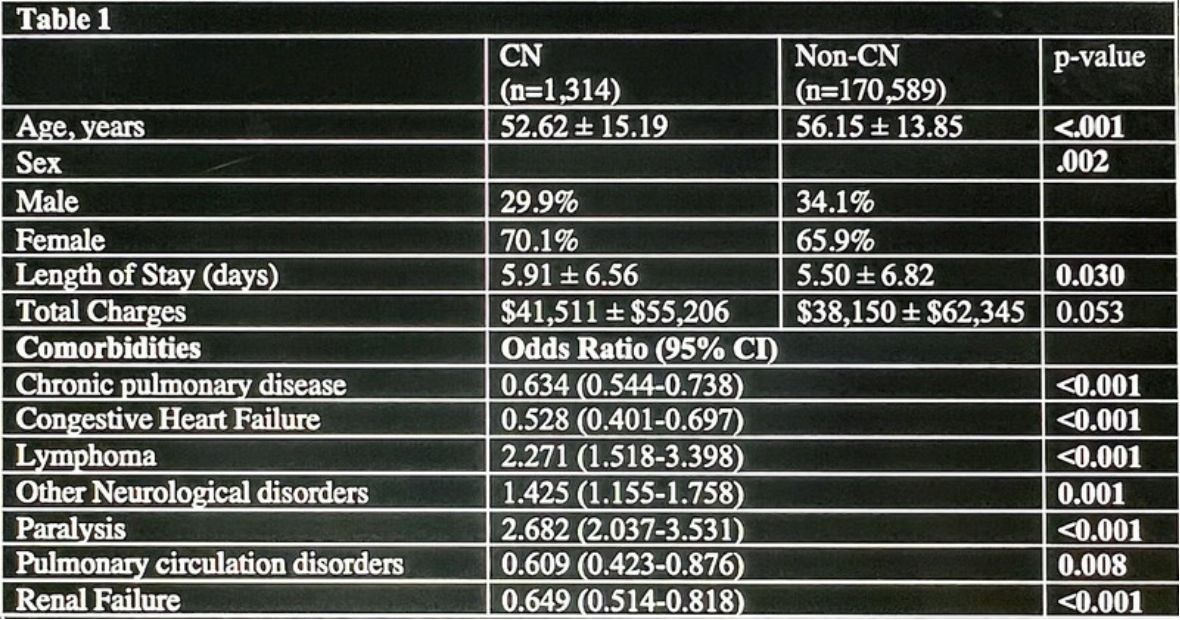Session Information
Date: Tuesday, November 14, 2023
Title: (1913–1944) Miscellaneous Rheumatic & Inflammatory Diseases Poster III
Session Type: Poster Session C
Session Time: 9:00AM-11:00AM
Background/Purpose: Sarcoidosis is a systemic granulomatous inflammatory disease that affects multiple organ systems including the including the lungs, skin, skeletal, and nervous system. Cranial neuropathies (CN) involving the optic, facial, and oculovestibular nerves can be an isolated manifestation. Here, we aim to identify comorbidities in this subset of sarcoidosis patients to raise a higher suspicion for this diagnosis; thereby, avoiding a delay in appropriate management.
Methods: The National Inpatient Sample (NIS) from 2003 to 2014 was queried to identify patients diagnosed with sarcoidosis (ICD9: 135). Patients with sarcoidosis were categorized into two groups based on whether they had comorbid CN palsies and disorders (CN I-XII palsy, multiple CN palsies, optic neuritis, trigeminal neuralgia, and sensorineural hearing loss).Univariate and multivariate analyses were conducted to compare patient and hospital characteristics as well as Elixhauser comorbidities between the two groups.
Results: Approximately 0.8% (n=1,314) of patients with sarcoidosis (n=173,236) had CN. Patients with CN were significantly younger (52.62 years±15.19 vs 56.15±13.85, p< 0.001) and female (70.1% vs 65.9%, p=0.002) compared to their non-CN counterparts. Although length of hospital stay (5.91days ± 6.56 vs 5.50±6.82, p=0.030) was significantly longer for sarcoidosis with CN, total hospital charges($41,511±$55,206 vs $38,150±$62,345, p=0.053)did not significantly differ between the groups. Patients were at significantly lower odds to develop CN if they had comorbid chronic pulmonary disease (OR [95% CI]:0.634 [0.544-0.738], p< 0.001),congestive heart failure (0.528 [0.401-0.697], p< 0.001), pulmonary circulation disorders (0.609 [0.423-0.876], p=0.008), or renal failure (0.649 [0.514-0.818], p< 0.001).Patients with lymphoma (2.271 [1.518-3.398], p< 0.001), other neurologic disorders (1.425 [1.155-1.758], p=0.001) and non-facial paralysis (2.682 [2.037-3.531], p< 0.001) had increased likelihood of developing CN. The presence of comorbid coagulopathy, iron deficiency anemia, diabetes, liver disease, or fluid/electrolyte disorders did not significantly impact the likelihood of developing CN (table 1).
Conclusion: Our analysis demonstrates greater odds of CN in sarcoidosis patients with comorbid lymphoma, other neurologic disorders, or non-facial paralysis. However, sarcoidosis patients with cardiopulmonary comorbidities or renal failure were less likely to have CN, suggesting that sarcoidosis patients with CN may somewhat spare other organs. Sarcoidosis patients who are relatively young, have other neurological disorders, non-facial paralysis, or lymphomas require a higher index of suspicion for CN.
To cite this abstract in AMA style:
Salim M, Kokush E, Kalyoussef E, Capitle E, Khianey R. Cranial Nerve Manifestations in Sarcoidosis Associated with Lymphoma, Non-facial Paralysis, and Other Neurologic Disorders [abstract]. Arthritis Rheumatol. 2023; 75 (suppl 9). https://acrabstracts.org/abstract/cranial-nerve-manifestations-in-sarcoidosis-associated-with-lymphoma-non-facial-paralysis-and-other-neurologic-disorders/. Accessed .« Back to ACR Convergence 2023
ACR Meeting Abstracts - https://acrabstracts.org/abstract/cranial-nerve-manifestations-in-sarcoidosis-associated-with-lymphoma-non-facial-paralysis-and-other-neurologic-disorders/

